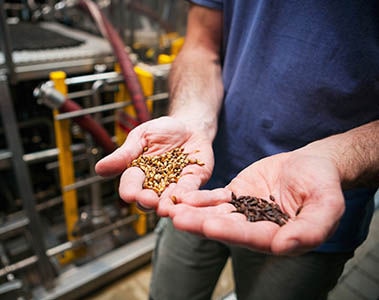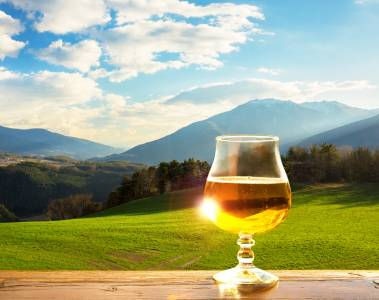
8 November 2022
News
mei 5, 2022
It’s no longer enough to talk about sustainability; the time has come to put words into action. In the brewing industry, some of the largest companies in the business are putting a firm stake in the ground and committing to ambitious planet targets. How achievable are they?
Driving change in any industry requires a critical mass of good intention and meaningful action. As climate change comes to the forefront of the public agenda, it’s clear that market success and long-term viability for any business will depend on building more sustainable operations. That’s because today’s conscious consumers are mindful of the environmental impact of the products they purchase, and the power they have to create a greener future through their choices.
It’s no longer enough to talk about sustainability; the time has come to put words into action. In the brewing industry, some of the largest companies in the business are putting a firm stake in the ground and committing to ambitious planet targets. How achievable are they?
Driving change in any industry requires a critical mass of good intention and meaningful action. As climate change comes to the forefront of the public agenda, it’s clear that market success and long-term viability for any business will depend on building more sustainable operations. That’s because today’s conscious consumers are mindful of the environmental impact of the products they purchase, and the power they have to create a greener future through their choices.
The brewing industry is taking note, and leading players are making clear commitments to embrace sustainability throughout their operations. Just recently, Diageo launched a 10-year sustainability action plan with ambitious targets that align to the United Nations Sustainable Development Goals (SDGs). Among their plan’s three focus areas is ‘pioneering grain-to-glass sustainability’, and the company is setting goals to achieve net zero carbon emissions from direct operations and to use 30% less water in every drink it produces by 20301. Carlsberg have also set ambitious science-based targets to reach ZERO emissions from their breweries by 2030, read in detail about their sustainability roadmap here.
ABInBev has similarly aligned to the SDGs and committed to its own 2025 Sustainability Goals that include getting 100% of purchased electricity from renewable sources2.
HEINEKEN announced its 2030 Brew a Better World programme, a set of ambitious commitments aimed at driving a positive impact on the environment, social sustainability and the responsible consumption of alcohol, as part of their efforts towards net zero carbon by 2030.
“The momentum within the brewing industry toward sustainable operations, and the commitment from many global breweries to take real action to get there, is both compelling and really exciting for all of us,” says Joana Carneiro, Business Director Beverages, dsm-firmenich Food Specialties.
“As a partner to breweries around the world, dsm-firmenich is responding in kind with a broadening portfolio of brewing enzymes that will help brewers produce a more sustainable glass of beer that tastes great and begs another sip.”
As an example, dsm-firmenich recently added Maxadjunct™ ß L, a high-performance adjunct brewing enzyme, to its enzyme portfolio. The choice of raw material can have a significant impact on overall efficiency, energy usage and cost. Thus, brewers invested in more sustainable production can increase the use of adjuncts, such as rice, maize and cassava, to help reduce the amount of malt in their recipes. The malting process for barley is quite energy- and water-intensive, so using less of it and increasing the ratio of adjuncts can have a big impact on reducing CO2 emissions.
Maxadjunct™ ß L gives brewers the flexibility to use a wide variety of raw materials (even up to 100% adjuncts) and deliver the same great-tasting beer. An added benefit is that adjuncts are often sourced locally, which further contributes to a circular economy in the region and a lower carbon footprint.
Enzymes are naturally sustainable, simple to use and can be added to different stages of brewers’ existing production processes, depending on the application and intended effect. Right now our Brewer’s Clarex® has been in the market for more than 10 years and is a proven technology with an average of 1 per 4 bottles in beer production being brewed with it to support a variety of sustainability targets globally . It’s a unique liquid enzyme added to the fermentation stage that streamlines beer stabilization by eliminating the deep cooling and rinsing step.
This reduced maturation time (by one day) can enable brewers to cut their carbon footprint by 5-6%, reduce water use by 1% and reach energy cost savings up to €70,000 per 1 million hectoliters of beer produced. In fact, if all the beer in Europe was made with Brewers Clarex®, the energy saved (327 KWH) would equal €30 million in cost savings and 52,000 fewer cars on the road for one year!
Brewers Clarex® and the rest of dsm-firmenich's portfolio of robust brewing enzymes is complemented by a highly skilled team of application experts, with years of experience helping breweries deliver sustainable, on-trend beverages to consumers.
It’s clear that sustainability is no longer a trend but a requirement – for doing business, for staying in business and for countering the impact of climate change. When businesses large and small get on board and make tangible commitments to ensure a greener future, as has happened in brewing, it creates opportunities for innovative solutions, like dsm-firmenich's portfolio of brewing enzymes, that will help enable this future.
Het is niet langer genoeg om over duurzaamheid te praten; het is tijd om de daad bij het woord te voegen. In de brouwerijsector zetten enkele van de grootste bedrijven in de sector een stevige voet in de grond en verbinden ze zich tot ambitieuze planeetdoelstellingen. Hoe haalbaar zijn ze?
In elke sector is een kritische massa van goede bedoelingen en zinvolle actie nodig om verandering teweeg te brengen. Nu klimaatverandering steeds hoger op de publieke agenda komt te staan, is het duidelijk dat marktsucces en levensvatbaarheid op de lange termijn voor elk bedrijf afhangen van het opbouwen van duurzamere activiteiten. Dat komt omdat de bewuste consumenten van vandaag zich bewust zijn van de impact op het milieu van de producten die ze kopen en de macht die ze hebben om een groenere toekomst te creëren door hun keuzes.
De brouwerijsector neemt hier nota van en toonaangevende spelers doen duidelijke toezeggingen om duurzaamheid in al hun activiteiten te omarmen. Onlangs nog lanceerde Diageo een 10-jarig duurzaamheidsactieplan met ambitieuze doelstellingen die aansluiten bij de Sustainable Development Goals (SDG's) van de Verenigde Naties. Een van de drie aandachtsgebieden van hun plan is 'baanbrekend graan tot glas duurzaamheid', en het bedrijf stelt doelen om netto nul koolstofuitstoot te bereiken van directe activiteiten en om 30% minder water te gebruiken in elke drank die het produceert tegen 20301. Carlsberg heeft ook ambitieuze, op wetenschap gebaseerde doelen gesteld om in 2030 NUL emissies uit hun brouwerijen te halen. lees hier in detail over hun routekaart voor duurzaamheid.
ABInBev heeft zich op dezelfde manier aangesloten bij de SDG's en heeft zich geëngageerd voor haar eigen 2025 Duurzaamheidsdoelen die onder andere inhouden dat 100% van de aangekochte elektriciteit afkomstig is van hernieuwbare bronnen2.
HEINEKEN kondigde haar 2030 Brew a Better World programma aan, een reeks ambitieuze engagementen gericht op het stimuleren van een positieve impact op het milieu, sociale duurzaamheid en verantwoorde alcoholconsumptie, als onderdeel van hun inspanningen om tegen 2030 koolstofneutraal te zijn.
"Joana Carneiro, Business Director Beverages, DSM Food Specialties: "Het momentum binnen de brouwerijsector in de richting van duurzame bedrijfsvoering en de toezegging van veel wereldwijde brouwerijen om echt actie te ondernemen om dit te bereiken, is zowel overtuigend als erg opwindend voor ons allemaal.
"Als partner van brouwerijen over de hele wereld reageert DSM met een breder assortiment brouwenzymen die brouwers zullen helpen een duurzamer glas bier te brouwen dat heerlijk smaakt en om een volgende slok smeekt."
Zo heeft DSM onlangs Maxadjunct™ ß L, een hoogwaardig brouwenzym, toegevoegd aan zijn enzymportfolio. De keuze van de grondstof kan een aanzienlijke invloed hebben op de algemene efficiëntie, het energieverbruik en de kosten. Zo kunnen brouwers die investeren in duurzamere productie het gebruik van hulpstoffen zoals rijst, maïs en cassave verhogen om de hoeveelheid mout in hun recepten te verminderen. Het moutproces voor gerst is behoorlijk energie- en waterintensief, dus minder mout gebruiken en de verhouding tussen toegevoegde stoffen verhogen kan een grote impact hebben op het verminderen van de CO2-uitstoot.
Maxadjunct™ ß L geeft brouwers de flexibiliteit om een grote verscheidenheid aan grondstoffen te gebruiken (zelfs tot 100% adjuncten) en hetzelfde geweldig smakende bier te leveren. Een bijkomend voordeel is dat hulpstoffen vaak lokaal worden ingekocht, wat verder bijdraagt aan een circulaire economie in de regio en een lagere CO2-voetafdruk.
Enzymen zijn van nature duurzaam, eenvoudig te gebruiken en kunnen worden toegevoegd aan verschillende stadia van de bestaande productieprocessen van brouwers, afhankelijk van de toepassing en het beoogde effect. Op dit moment is onze Brewer's Clarex® al meer dan 10 jaar op de markt en het is een bewezen technologie waarmee gemiddeld 1 op de 4 flesjes bier wordt gebrouwen ter ondersteuning van verschillende duurzaamheidsdoelstellingen wereldwijd. Het is een uniek vloeibaar enzym dat wordt toegevoegd aan de fermentatiefase en dat de stabilisatie van bier stroomlijnt door de stap van diep koelen en spoelen te elimineren.
Deze kortere rijpingstijd (met één dag) kan brouwers in staat stellen hun koolstofvoetafdruk met 5-6% te verlagen, hun waterverbruik met 1% te verminderen en tot €70.000 aan energiekosten te besparen per 1 miljoen hectoliter geproduceerd bier. Als al het bier in Europa zou worden gemaakt met Brewers Clarex®, zou de bespaarde energie (327 KWH) gelijk staan aan €30 miljoen aan kostenbesparingen en 52.000 minder auto's op de weg gedurende één jaar!
Brewers Clarex® en de rest van DSM's portfolio van robuuste brouw-enzymen wordt aangevuld door een zeer deskundig team van applicatie-experts, met jarenlange ervaring in het helpen van brouwerijen bij het leveren van duurzame, trendy dranken aan consumenten.
Het is duidelijk dat duurzaamheid niet langer een trend is, maar een vereiste - om zaken te doen, om zaken te blijven doen en om de gevolgen van klimaatverandering tegen te gaan. Wanneer grote en kleine bedrijven meedoen en zich concreet inzetten voor een groenere toekomst, zoals in de brouwerij is gebeurd, ontstaan er kansen voor innovatieve oplossingen, zoals DSM's portfolio van brouwenzymen, die deze toekomst mogelijk helpen maken.
Brewers Compass® enables brewers to replace malt with locally available raw materials, such as barley or blends of wheat, maize, rice, sorghum and cassava. The barley malting process accounts for approximately 10 to15% of the eco-footprint of beer. Switching from malt to barley brewing allows a 10% reduction in barley consumption and cuts water and energy use. When brewing with 100% barley, using Brewers Compass®, the carbon footprint savings are typically over 60 kilograms of CO₂ per ton of barley used.
Brewers Compass® stelt brouwers in staat om mout te vervangen door lokaal beschikbare grondstoffen, zoals gerst of mengsels van tarwe, maïs, rijst, sorghum en cassave. Het mouten van gerst is verantwoordelijk voor ongeveer 10 tot 15% van de ecologische voetafdruk van bier. Door over te schakelen van brouwen met mout op brouwen met gerst kan het gerstverbruik met 10% worden teruggedrongen en wordt er minder water en energie verbruikt. Bij het brouwen met 100% gerst, met Brewers Compass®, bedraagt de besparing op de koolstofvoetafdruk doorgaans meer dan 60 kilogram CO₂ per ton gebruikte gerst.
DSM's unieke oplossing voor bierstabilisatie, Brewers Clarex®, verkort de rijpingstijd van bier. Door toevoeging tijdens de fermentatiefase van het brouwen, Brewers Clarex® kunnen brouwers de diepe koel- en spoelstap in het bierstabilisatie- en klaringsproces overslaan en zo energie en water besparen. Door eenvoudigweg over te schakelen op Brewers Clarex® kan de koolstofvoetafdruk van brouwerijen met 5 tot 6% worden verminderd, kan het waterverbruik met 1% worden teruggedrongen en kunnen energiekosten tot €70.000 per 1 miljoen hectoliter geproduceerd bier worden bespaard.
dsm-firmenich's unique solution for beer stabilization, Brewers Clarex®, reduces the maturation time of beer. Added during the fermentation stage of brewing, Brewers Clarex® allows brewers to skip the deep cooling and rinsing step in the beer stabilization and clarification process, helping to save energy and water. Simply switching to Brewers Clarex® can reduce the carbon footprint of brewing companies by 5 to 6%, reduce water usage by 1% and tally energy cost savings up to €70,000 per 1 million hectoliters of beer produced.

8 November 2022

13 August 2022

9 March 2023